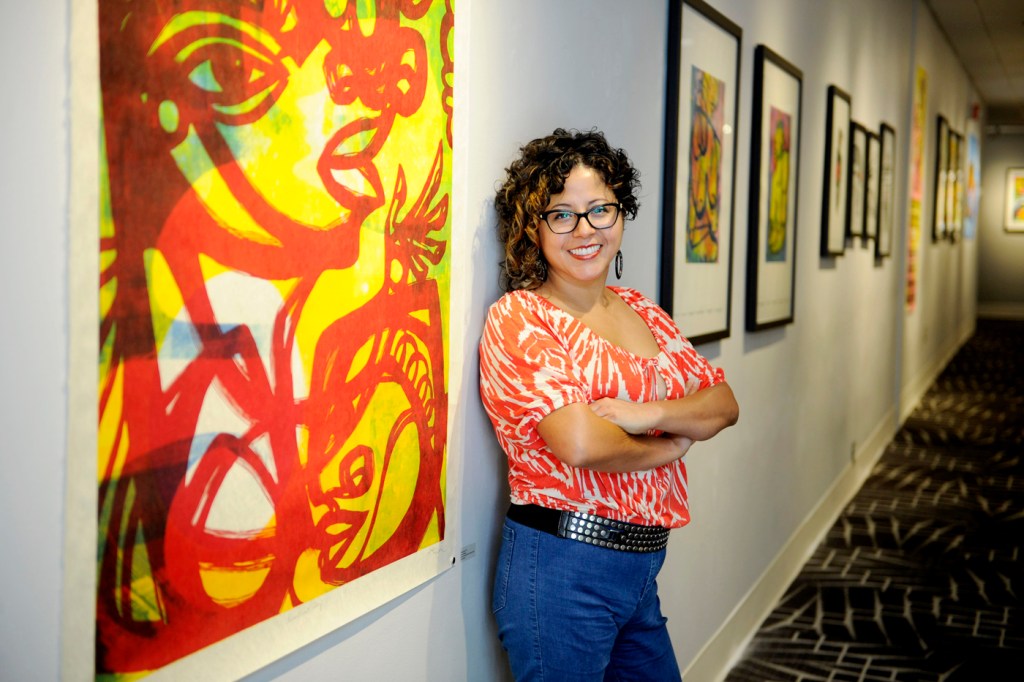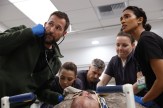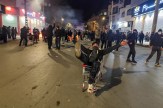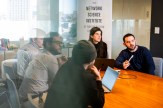How art can disrupt our ideas and identities

Artist Favianna Rodriguez makes bold, sparkling works that light up a room even as they reveal dark cultural inequities.
She is known for her activism and political posters addressing issues such as racism, women’s rights, displacement, and climate change. Now, for the first time, her abstract prints—multilayered collages of vibrant colors and reverberating shapes—are on display: 27 of them line the walls in Northeastern’s Gallery 360 in an exhibit called “The Multiverse of Identity” as she begins her weeklong stint at Northeastern as artist in residence. The exhibit opened earlier this month and runs through mid-December.
Rodriguez will be talking about her vision of art as both an agent of social change and individual narrative on Wednesday, Sept. 23, at 6 p.m., in Blackman Auditorium.
Her aim
Rodriguez’s goal is to open minds to the power of art to reflect people and societal causes in all their complexity.
“I love the idea that art disrupts ideas and identities,” says Rodriguez, 36, whose parents emigrated in the late 1960s from Peru to Oakland, California, where she was influenced by the street art culture of the 1980s and ’90s: hip-hop, graffiti, feminism. “It offers ways to reframe who you are.
I want to offer the viewer the choice to explore the spectrum of what creativity can be,”
—Rodriguez said.
Her inspiration
Her own spectrum is expansive. As an adolescent, she attended school in Mexico City, where she soaked up the richness of Mayan colors and the palette of Mexican muralists. Through high school she excelled in not just art but also science and math (she almost became an engineer). She counts both Henri Matisse’s shape-shifting exhibit “The Cut-Outs” and the TV show “Cosmos: A Spacetime Odyssey,” hosted by astrophysicist Neil deGrasse Tyson, among the inspirations for her Gallery 360 show.
“A lot of the pieces concern ecosystems and interconnectedness,” Rodriguez says. “What I’m trying to say is that everything—we, the planet, the galaxies—is interconnected. We need to use our shared humanity as a starting point to solve problems like the wealth gap and climate change.”
She offers an example of the latter. “We forget about our relationship to the natural world, for instance, that we rely on plants for our oxygen,” she explains. “I want to remind people about that interdependence, not just focus on carbon monoxide in the air.”
Bree Edwards, director of the Northeastern Center for the Arts, notes how that focus reflects Northeastern’s dedication to bringing disparate disciplines together.
“Favianna is one of the visionary artists of our time,” says Edwards. “She is a creative citizen, an artist, organizer, entrepreneur, a change agent. We are honored that she is the first artist in residence of the year at the Northeastern Center for the Arts, because she shows us how art, advocacy, and technology can inspire social change, and these are themes that we are passionate about in the College of Arts, Media and Design.”
Her process
Rodriguez’s process for making her abstract works—intaglio printing, using an etching plate—is “very, very elaborate.” Each piece takes months. To start, she applies ink to create texture on multiple sheets of Japanese paper, producing a “library of colors.” “I think of the practice as creating the container in which I’m going to play,” she says. She then cuts the paper into shapes—now spikey, now undulating—and arranges them in a “playful way.” “The arranging—repeating shapes, refining them—is what gives each piece its own character,” she says.
The colors smack you in the face. “For me, color is about possibility,” she says. It characterizes both her art and her commitment to breaking apart assumptions—for herself, for all of us. “I don’t like when people put me in the woman box or the Latina box or the political artist box,” she says. “That limits who I am as an individual. I want to instead embrace the possibility of who I can be. That’s where ultimate freedom is.”
“The Multiverse of Identity” is infused with that sense of freedom. “I want to encourage people to go back to a place of humanity, a place of beauty,” she says. “My hope is that people feel good and peaceful when they look at the exhibit, and that we can connect based on our humanity, our resilience, and the things that we love and enjoy.”
Favianna Rodriguez will be talking about her vision of art as both an agent of social change and individual narrative on Wednesday, Sept. 23, at 6 p.m., in Blackman Auditorium. During her weeklong residency on campus, she will participate in various courses, including Introduction to Women’s Studies and Communication and Inclusion, and conduct a workshop on art as a change agent for both students and members of the community.







